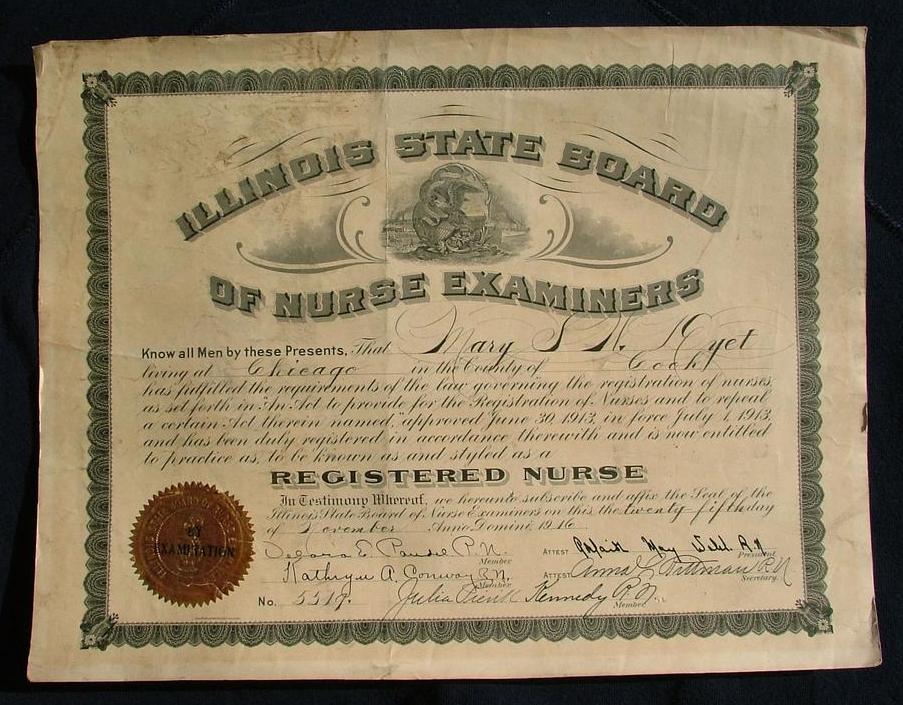Open Resources for Nursing (Open RN)
Licensure is the process by which a State Board of Nursing (SBON) grants permission to an individual to engage in nursing practice after verifying the applicant has attained the competency necessary to perform the scope of practice of a registered nurse (RN).[1] The SBON verifies these three components:
- Verification of graduation from an approved prelicensure RN nursing education program
- Verification of successful completion of NCLEX-RN examination
- A criminal background check (in some states)[2]
In the United States there are three common types of prelicensure educational programs that prepare a student to become an RN, including a two-year associate degree of nursing (ADN), a hospital-based diploma program, or a four-year baccalaureate degree (BSN). Some universities offer an “Entry Level Master of Science in Nursing Track” for non-nurses holding a baccalaureate or master’s degree in another field who wish to become a nurse. All graduates must pass the same NCLEX-RN to obtain their RN license from their SBON (or other nursing regulatory body).
Requirements for licensure renewal vary from state to state. Some states require continued education credits (CEUs), along with the payment of fees. In Wisconsin the nursing license is renewed every two years. See Figure 11.2[3] for an image of a simulated nursing license.

- Use this map for contact information for the State Boards of Nursing.
- Read more details on obtaining a Wisconsin RN license at https://dsps.wi.gov/Pages/Professions/RN/Default.aspx.
Nurse Licensure Compact
When applying for your nursing license from your State Board of Nursing (SBON), you may also be eligible to apply for a multistate license. The Nurse Licensure Compact (NLC) allows nurses to practice in other NLC states with their original state’s nursing license without having to obtain additional licenses, contingent upon remaining a resident of that state. Currently, 38 states have enacted the NLC. Read more information about the NLC using the information in the following box.
View the current Nurse Licensure Compact Map.
Read this algorithm on how to Navigate the Nurse Licensure Compact.
Read more information about the Nurse Licensure Compact Rules.
Watch a video for nursing students on the Nurse Licensure Compact.
Temporary Permit
In some states before taking the NCLEX, an applicant may apply to receive a temporary permit from their State Board of Nursing (SBON). A temporary permit allows the applicant to practice practical nursing under the direct supervision of a registered nurse until the RN license is granted. A temporary permit is typically valid for a period of three months or until the holder receives failing NCLEX results, whichever is shorter.
Read about the temporary permit available in Wisconsin.
- NCSBN. https://www.ncsbn.org/nclex.htm ↵
- NCSBN. https://www.ncsbn.org/nclex.htm ↵
- “3277658479_86d3d7d61c_o.jpg” by Vernon Dutton is licensed under CC BY-NC-SA 2.0 ↵
The process by which a State Board of Nursing (SBON) grants permission to an individual to engage in nursing practice after verifying the applicant has attained the competency necessary to perform the scope of practice of a registered nurse (RN).
State legislation that allows nurses to practice in other NLC states with their original state’s nursing license without having to obtain additional licenses, contingent upon remaining a resident of that state.
A permit issued by the State Board of Nursing (SBON) that allows the applicant to practice practical nursing under the direct supervision of a registered nurse until their RN license is granted.

